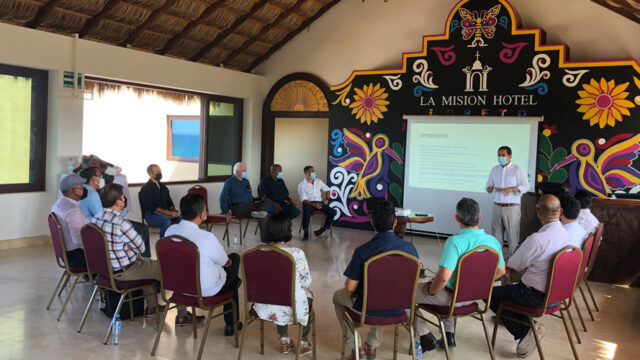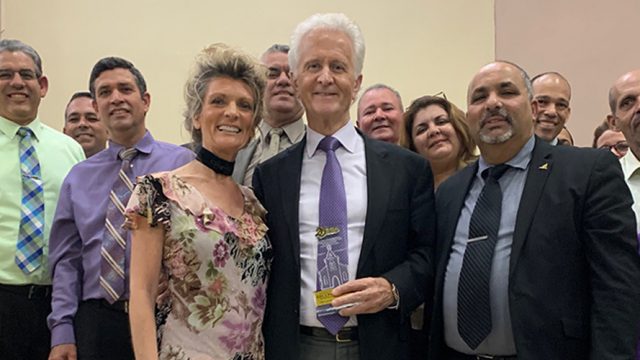Rediscovering the power of an essential trait

We don’t often hear the words “gentleness” or the even older term, “meekness,” nowadays. They are rarely present in the public discourse where politicians and leaders stake out their turf by projecting strength, power, or capable leadership. Media—including social media—thrives on conflict and tension, but not on gentleness. Spending time reviewing comments on Facebook, news media sites, and even church media sites offers many examples of the lack of gentleness—even among members of the same faith community.
WHAT IS GENTLENESS?
Synonymous words that come to mind when we think about gentleness include kindness, tenderness, mildness. The cultures we live in often equate “gentleness” with powerlessness or being unable to change our reality significantly. Yet the many references to gentleness and being gentle in Scripture offer us a different picture.
Imagine for a moment the following image that illustrates well the idea of gentleness. Envision a tall, muscular fireman rigged out to fight a major fire. He wears a thick, flame-retardant jacket and pants in bright yellow or orange. His hands, covered in special gloves, are huge. He carries an oxygen tank on his back, and a bright-yellow helmet crowns his head. He is covered in grime and looks sweaty. As we zoom in on the image, we suddenly see a fluffy, tiny ball of fur in his hands. The fireman has just saved a kitten from a fire. That picture is ready to go viral. It communicates gentleness, compassion, and care amid chaos, pain, and destruction.
Gentleness is compassion that has become visible—sometimes in small, seemingly insignificant ways. The Bible uses “gentle” (together with a noun that is described further by this adjective) and “gentleness” in a number of distinct contexts. Proverbs, notes Leland Ryken in the Dictionary of Biblical Imagery, includes “two striking images of gentleness in its disarming power.”¹ “A gentle tongue can break a bone” (Prov.25:15, NIV) offers a unique perspective on the power of language—including also for good as noted in Proverbs 15:1: “A gentle answer turns away wrath” (NIV).
Gentleness and gentle speech, however, should not be mistaken for weakness or feebleness. Psalm 18:35 refers to God’s gentleness on behalf of the psalmist—and, by extension, God’s people. The language uses military imagery (verses 32, 34, 35), but it is God’s gentleness, not military might, that makes us greatness. The underlying Hebrew term translated with “gentleness” is associated with humility, forbearance, and burden bearing. We are confronted with a clear paradox: only God’s gentleness and grace can make humans great. Only God’s gentle compassion and care can reach and transform our sin-hardened hearts.
THE FIERCE AND GENTLE GOD
We often find this paradox in the many descriptions of divine revelation. While the people experienced the fire and thunder covering Sinai, felt the quakes shaking the ground, and trembled at God’s revelation of power (Ex. 19:16-20), God chooses the “gentle whisper” (NIV) or the “still small voice” (NKJV) to reveal Himself to depressed and disappointed Elijah (1 Kings 19:12). In Scripture God is the warrior (Ex. 15:3; Isa. 42:13), but He is also the shepherd, who gently cares for His flock (Ps. 23). He is the healer (Ex. 15:26; Deut. 7:15), yet He is also the judge (Ps. 75:7; Isa. 66:16). As judge, lawgiver, and king, God will save His people (Isa. 33:22).
There is one underlying divine attitude that expresses itself in all the metaphors mentioned above. God is driven by an unshakable love toward His creation (1 John 4:8)— and out of love He fights on behalf of His people, judges His people, gives them His life-giving principles (or laws) that bless them, and, ultimately, saves His people.
Exodus 34:6, 7 have been described as the heart of the Old Testament’s talking about God. These verses portray a key moment of divine self-revelation, and while we can see both the fierce and the gentle side of God’s character, we note that His gentleness, compassion, longsuffering, and mercy both precede and balance His righteous justice.
SEEING GENTLENESS IN THE FLESH
Jesus’ coming to this fallen planet accelerated the rhythm and cadence of God’s plan of salvation. The God-man described Himself as “gentle and humble in heart” (Matt. 11:29, NIV)—ready and willing to be the sin and burden bearer. He arrived as a helpless babe, born into a poor family; he experienced the anxiety of living as a refugee in Egypt, and then matured in the unsophisticated Galilean town of Nazareth. These life experiences did not mesh with popular messianic expectations. Yet He showed us how gentleness, compassion, and tenderness can affect dramatic transformation. John later describes Him as “the Lamb who was slain,” but through His sacrifice receives “power and riches and wisdom, and strength and honor and glory and blessing” (Rev. 5:12). “Gentleness is an image of God’s ultimate subversive power that undercuts the power structures of this world,” notes Ryken fittingly.²
Jesus’ compassion and gentleness can be seen in many ways as He engaged with His creation. Seeing the multitudes, He was moved with compassion to heal the sick (Matt. 14:14) and feed the hungry (Matt. 15:32-39). He touched the dead daughter of Jairus before He raised her (Mark 5:42), and gently said “Don’t cry” (see Luke 7:13) to a mourning widow before calling her only son back to life (verses 14-17).
“The Saviour went from house to house, healing the sick, comforting the mourners, soothing the afflicted, speaking peace to the disconsolate,” writes Ellen White. “He took the little children in His arms and blessed them, and spoke words of hope and comfort to the weary mothers. With unfailing tenderness and gentleness He met every form of human woe and affliction.”³
Gentleness is often communicated by touch. We see Jesus touching many people as He communicates God’s love to them. Nonverbal communication is extremely important for the deaf and mute man that receives Jesus’ gentle touch (Mark 7:31-36). Similarly, a blind man feels Jesus’ touch—and receives sight (Mark 8:22-26).
CALLED TO LIVE GENTLE LIVES
References to gentleness appear repeatedly in the New Testament. Paul, the former fanatical persecutor of the church, lists gentleness as one expression of the fruit of the Spirit that doesn’t come naturally to human beings (Gal. 5:23). True gentleness can flourish and grow only where God’s Spirit is present and at work. Paul also admonishes the church at Colossae, “as God’s chosen people, holy and dearly loved, [to] clothe yourselves with compassion, kindness, humility, gentleness, and patience” (Col. 3:12, NIV). He often highlights his own gentle dealing with the churches to whom he addresses his letters (1 Cor. 4:21; 1 Thess. 2:7). The attitudes listed in these texts reflect the values of God’s kingdom that Jesus highlighted in His sermon on the mount (Matt. 5-7). We don’t associate these values and attitudes with the powerful and successful people our cultures celebrate today, for they are truly countercultural.
Most of us agree with the assertion that gentleness is an important part of a Christlike character, yet we wonder how we can learn to be more gentle, more compassionate, more kind, and more caring. We like the ideal—but we recognize that our reality falls short of the ideal.
Humility is an essential element of gentleness. When we humble ourselves, we begin to think less of ourselves and more of others. Our value is not based on our achievements or even qualities, but is anchored in God’s acceptance and love for us. We recognize that the grace we have received from the gentle Healer miraculously multiplies when we share it with people around us. We begin to imitate the attitudes we can see in the Godhead.
God often uses trials and challenges in our own lives to draw us closer to Him, for it’s in these moments that we recognize His unending comfort. “God whispers to us in our pleasures, speaks in our conscience, but shouts in our pain: it is His megaphone to rouse a deaf world,” writes the Christian author C. S. Lewis.⁴ We may feel confounded by the pain and havoc inflicted by God’s enemy—and are tempted to denounce the God we blame for it. He alone is our deliverance, but we sometimes curse Him for trying to get our attention.
Paul offers this perspective to the Corinthian members: “If we are distressed, it is for your comfort and salvation; if we are comforted, it is for your comfort, which produces in you patient endurance of the same sufferings we suffer” (2 Cor. 1:6, NIV). When we have experienced God’s gentle comfort, we are equipped to comfort others around us.
CROSSING THE FINISHING LINE
Gentleness, probably more than any other trait, shows a life hidden with God in Christ. Rather than being a sign of weakness, it powerfully bears witness to the fact that the meek, gentle followers of the Good Shepherd know their value. They are secure in the knowledge that they are loved, and instead of hanging on to selfish power structures, they can share that love through gentleness. Though not always obvious, they know that not the noisy, proud, or ruthless, but the meek “shall inherit the earth” (Matt. 5:5).
¹ Leland Ryken et al., Dictionary of Biblical Imagery (Downers Grove, Ill.: InterVarsity Press, 2000), p. 325.
² Ibid.
³ Ellen G. White, The Acts of the Apostles (Mountain View, Calif.: Pacific Press Pub. Assn., 1911), p. 364.
⁴ C. S. Lewis, The Problem of Pain (New York: HarperCollins, 1996), p. 91.








